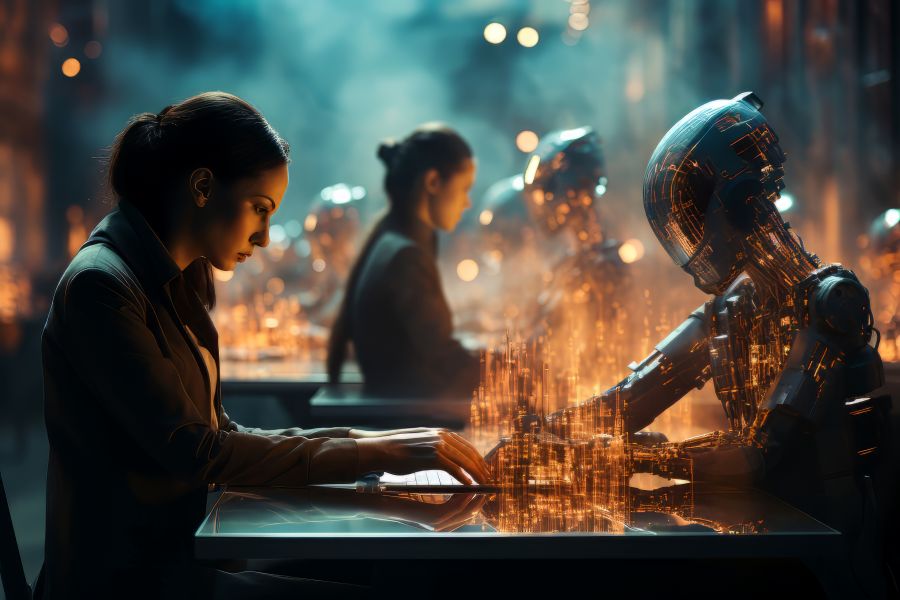The Intersection of AI and Quantum Computing: Exploring the Possibilities and Challenges
Think of a world where the most complex problems, the ones that stump even our most powerful computers today, become solvable.
That’s the promise of quantum AI– a field where the raw power of quantum computing meets the intelligent problem-solving of artificial intelligence. Quantum AI computing is set to revolutionize industries by enhancing machine learning, optimizing simulations, and creating next-generation cryptographic systems. As quantum AI research advances, it is expected to drive unprecedented progress in fields ranging from drug discovery to financial modeling.
However, this exciting new territory also comes with its own set of challenges. Think of it like exploring a new continent: the potential rewards are huge, but we also have to navigate uncharted terrain, from figuring out how to correct quantum errors to developing entirely new ways of thinking about algorithms.
Let’s explore the key possibilities of AI quantum computing and the challenges we must overcome to harness its full potential.
Key Possibilities
1. Quantum Machine Learning
Traditional machine learning algorithms struggle with the sheer volume of data in many modern applications. Quantum computers, with their ability to exist in multiple states simultaneously (superposition) and exploit quantum entanglement, can process and analyze this data in ways that are impossible for classical computers. This capability enables the development of quantum machine learning models that are more complex, faster, and accurate.
For instance, training a machine learning model to predict protein folding is a computationally intensive task. A quantum machine learning algorithm could analyze the vast number of possible protein configurations much faster than classical
algorithm, significantly improving predictions. This has huge implications for drug discovery and materials science.
2. Enhanced Simulation Capabilities
Classical computers struggle to accurately simulate the behavior of molecules due to the complex interactions between electrons. Quantum computers, however, operate based on the principles of quantum mechanics, making them ideal for simulating molecular behavior.
In drug discovery, researchers currently synthesize and test many different molecules to find potential candidates. With quantum AI research and quantum simulations, scientists can predict how a drug molecule interacts with a target protein before synthesis, drastically reducing development time and costs. Similarly, AI quantum computing can aid in the discovery of new materials by accurately modeling their atomic-level properties.
3. Optimization Problems
Optimization problems involve finding the best solution from a large number of possibilities. Classical algorithms often struggle with these problems due to their complexity, especially as the number of variables increases. Quantum algorithms, like quantum annealing, can explore solution spaces more efficiently, leading to optimal or near-optimal solutions much faster.
A prime example is the “traveling salesman problem,” which seeks the shortest route to visit a set of cities and return to the starting point. As the number of cities increases, classical computers struggle to solve it. AI quantum computing could rapidly determine near-optimal solutions, enhancing logistics, transportation systems, and even financial portfolio optimization.
4. Advanced Cryptography
Current encryption methods rely on the difficulty of factoring large numbers, a problem that classical computers struggle with. However, quantum computers using Shor’s algorithm can efficiently factor large numbers, potentially breaking existing encryption methods. This has driven the need for post-quantum cryptographic algorithms.
Artificial intelligence in quantum computing can be used to analyze the security of these new encryption techniques and design even stronger cybersecurity protocols. For instance, banks and financial institutions could use quantum-resistant encryption to safeguard customer data from potential quantum-based attacks.
Challenges to Overcome
1. Quantum Hardware Limitations
Despite rapid progress in AI quantum computing, quantum computers are still in their infancy. They are highly sensitive to errors and lose information quickly due to decoherence, making complex calculations unreliable.
Imagine trying to build a house with LEGOs, but the pieces keep randomly falling apart. While simple structures are possible, complex architectures are challenging. Similarly, current quantum computers can handle basic tasks, but advanced AI quantum applications remain beyond reach until quantum error correction techniques improve.
2. Algorithm Development
Quantum computers function differently from classical ones, requiring entirely new algorithms. Designing quantum algorithms that can leverage quantum machine learning and AI capabilities is a significant challenge, demanding expertise in both quantum mechanics and artificial intelligence in quantum computing.
Think of it like writing a program for a supercomputer that speaks an unfamiliar language. Developers must first learn this “quantum language” to create algorithms that maximize the benefits of AI quantum computing.
3. Integration with Existing AI Frameworks
Most current AI systems are designed for classical computers. Integrating quantum computing with these frameworks requires extensive development to ensure seamless data transfer and efficient hybrid processing.
Imagine trying to connect a high-speed train to a horse-drawn carriage. You would need special tracks and transition mechanisms. Similarly, integrating AI quantum computing with existing AI frameworks necessitates developing new protocols and hybrid processing architectures.
4. Expertise Gap
A major challenge in quantum AI computing is the shortage of professionals with expertise in both quantum computing and artificial intelligence. This skills gap slows down research and the deployment of quantum-powered AI solutions.
It’s akin to building a rocket to Mars with only a handful of rocket scientists. Without sufficient experts in both AI and quantum fields, progress remains hindered.
Conclusion
Quantum AI is like a newborn baby with limitless potential. We can already see glimpses of the revolutionary impact it may have – solving problems that classical computing cannot tackle. However, it requires extensive nurturing, from improving quantum hardware to developing sophisticated quantum algorithms.
As AI quantum computing evolves, it promises to be the next giant leap in technology. The demand for professionals who understand this powerful intersection of AI and quantum is about to explode. If you want to be at the forefront of this technological revolution, earning an AI + Quantum Certification from AI CERTs is your gateway to the future.
Enroll today and position yourself as a leader in the AI quantum revolution!
Recent Blogs

FEATURED
Best AI Certification Programs for Remote Jobs in 2025
April 25, 2025
FEATURED
AI Skill Gap and the Growing Need for AI Certifications
April 25, 2025
FEATURED
10X Your Training Institute’s Revenue with AI CERTs™ ATP Partnership
April 18, 2025
FEATURED
Why Training Institutes Are Embracing Certification Partner Programs in 2025
April 18, 2025